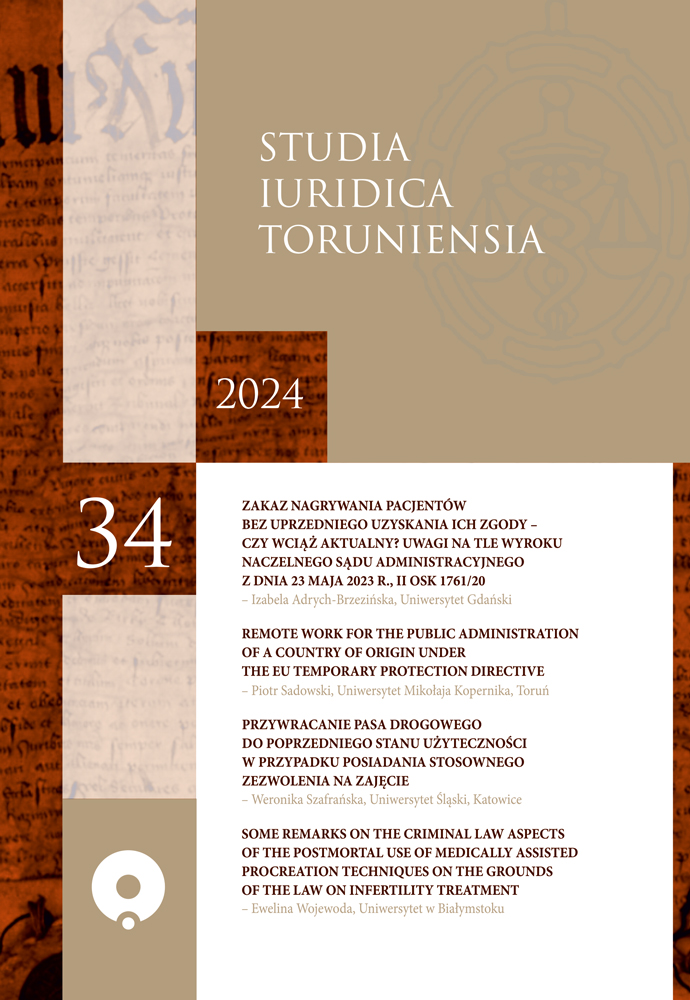The end of a spouse's life from the perspective of canonical marriage law
DOI:
https://doi.org/10.12775/SIT.2024.007Keywords
canonical marriage law, death in canon law, reasons for the cessation of marriage in canon lawAbstract
The end of the life of the spouse, as a legal event, is of significant importance in canon law. Indeed, the end of the life of the spouse in the case of a validly contracted and completed marriage is the only circumstance causing the termination of the marriage knot. Hence, the ecclesiastical legislator attaches considerable importance to the end of a spouse’s life. As has been proven from the point of view of canon law, the manner in which a spouse ends his or her life matters. This applies to the situation of spousal suicide. Although death by spousal suicide ends the marital knot, the surviving spouse cannot benefit from such a situation. Hence, the obstacle of spousal suicide has been established. The importance and significance of the end of a spouse’s life is of such significance that the ecclesiastical legislator, in case of doubt as to whether such an end has actually occurred, has provided for appropriate proceedings. These proceedings are initiated in the absence of an authentic secular or ecclesiastical document confirming the death of the spouse. A declaration by the diocesan bishop, issued after he has obtained moral certainty, replaces such a document. It should be noted that until such a declaration is issued, the surviving spouse is bound by the marriage bond.
References
Bañares J.I., w: Exegetical Commentary on The Code of Canon Law, t. III/2, red. Á. Marzoa, J. Miras, R. Rodríguez-Ocaña, Montreal–Chicago 2006.
Bączkowicz F., Prawo kanoniczne, t. 2, Kraków 1933.
Beal J.P., w: New Commentary on The Code of Canon Law, red. J.P. Beal, J.A. Coriden, T.J. Green, New York–Mahwah 2000.
Cenalmor D., Miras J., Prawo kanoniczne, Warszawa 2022.
Código de Derecho Canónico. Edición bilingüe, fuentes y comentarios de todos los cánones, red. A. Benlloch Poveda, Valencia 1993.
Commento al Codice di Diritto Canonico, red. P.V. Pinto, Città del Vaticano 2001.
Dullak K., Śmierć elementem sprawczym rozwiązania węzła małżeńskiego, „Prawo Kanoniczne” 2019, z. 2.
Gajda P.M., Prawo małżeńskie Kościoła katolickiego, Tarnów 2016.
Góralski W., Małżeństwo kanoniczne, Warszawa 2011.
Góralski W., Przeszkoda występku, w: Przeszkody małżeńskie w prawie kanonicznym, red. W. Góralski, Warszawa 2016.
Hervada J., w: Kodeks prawa kanonicznego. Komentarz, red. P. Majer, Kraków 2011.
Jończyk P., Odmowa dokonania czynności notarialnej w polskim i kanonicznym porządku prawnym, „Civitas et Lex” 2018.
Mikołajczuk K., Uznanie za zmarłego a możliwość zawarcia nowego małżeństwa, „Roczniki Nauk Prawnych” 2013, t. 23, nr 2.
Nadolski B., Liturgika. III – Sakramenty, Sakramentalia, Błogosławieństwa, Poznań 2012.
Poveda A.B., Código de derecho canónico. Edición bilingȕe, fuentes y comentarios de todos los cánones, wyd. 10, Valencia 2002.
Przyklenk W., w: Małżeństwo w Kościele katolickim oraz w czterech religiach niechrześcijańskich (judaizm, islam, hinduizm, buddyzm), red. G. Dzierżon, Kraków 2014.
Sztychmiler R., Stwierdzenie domniemanej śmierci współmałżonka, „Ius Matrimoniale” 2002, z. 7.
Świaczny S., Rozwiązanie małżeństwa i stwierdzenie nieważności małżeństwa w sądach kościelnych po reformie papieża Franciszka, Warszawa 2016.
Downloads
Published
How to Cite
Issue
Section
License
Copyright (c) 2024 Bartosz Rakoczy

This work is licensed under a Creative Commons Attribution-NoDerivatives 4.0 International License.
Stats
Number of views and downloads: 461
Number of citations: 0



